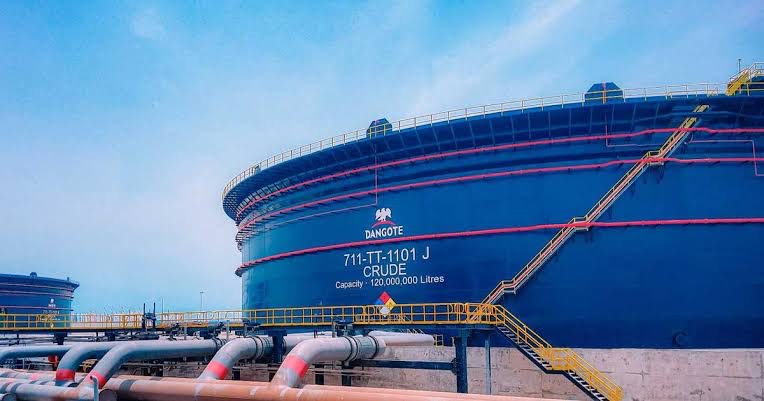Aliko Dangote, Chairman of the Dangote Group, confidently announced that Nigeria will soon stop importing premium motor spirit (PMS), or petrol, due to the strategic initiatives of the Dangote Refinery.
Speaking at the Africa CEO Forum Annual Summit in Kigali on Friday, Dangote revealed that the Dangote Refinery has already commenced the supply of diesel and aviation fuel within Nigeria.
He confidently stated that the refinery possesses the capacity not only to cater to the diesel and petrol needs of West Africa but also to meet the aviation fuel demands of the entire African continent.
With Nigeria being a prominent importer of petroleum products, particularly PMS, Dangote’s proclamation carries significant weight, offering a glimmer of hope for the country’s quest for energy self-sufficiency.
The prospect of the Dangote Refinery stepping in to fill this crucial gap underscores the potential transformative impact of indigenous industrial ventures on Nigeria’s economic landscape.
Dangote said, “Right now, Nigeria has no cause to import anything apart from gasoline, and by sometime in June, within the next four or five weeks, Nigeria shouldn’t import anything like gasoline—not one drop of a liter.
“We have enough gasoline to give to at least the entire West Africa, and diesel to give to West Africa and Central Africa. We have enough aviation fuel to give to the entire continent and also export some to Brazil and Mexico,” he said.
“Today, our polypropylene and our polyethene will meet the entire demand of Africa, and we are doing base oil, which is like engine oil; we are doing linear benzyl, which is a raw material to produce detergent. We have 1.4 billion people in the population; nobody is producing that in Africa.
“So, all the raw materials for our detergents are imported. We are producing that raw material to make Africa self-sufficient.
“As I said, give us three or a maximum of four years, and Africa will not, I repeat, not import any more fertilizer from anywhere. We will make Africa self-sufficient in potash, phosphate, and urea; we are at three million metric tons, and in the next twenty months, we will be at six million metric tons of urea, which is the entire capacity of Egypt. We are getting there.”
Recalling how his dream for further investment in Africa as well as ending fuel importation in Africa has led to what is now one of the biggest refineries in the world, Dagote said:
“For some of us, despite the boom of the capital market in the US—you know, Google, Microsoft, and the rest—we didn’t participate; we took all our money and invested in Africa.
“We had this dream just about five years ago, and we said we wanted to move from five billion dollars in revenue to thirty billion dollars in revenue, and we made it happen. It is possible, and now we have made it happen, and now we have finished our refinery.
“Our refinery is quite big; it is something that we believe that Africa needs. If you look at the whole continent, there are only two countries that don’t import petroleum products, which is a tragedy. They are only Algeria and Libya. The rest are all importers. So, we need to change and make sure that we don’t just go and produce raw materials; we should also produce finished products and create jobs.
“One of the things we also need to know as Africans is that we produce raw materials and export them. When you export raw materials, somebody now keeps importing things into your continent and dumping goods. What you are importing is poverty and exporting jobs. So, we have to change that narrative.”
“We just commissioned in February, and now we are producing jet fuel, diesel, and by next month, gasoline. What that would do is that we would be taking most of the African crude that is being produced and also be able to supply not only Nigeria, because our capacity is too big for Nigeria, but it would also supply West Africa, Central Africa, and also South Africa.
“We have 650,000 barrels per day, 1 million metric tons of polypropylene, and 590,000 metric tons of carbon black, which are the raw materials ink, dyes, and co. We are expanding more. This is the first phase, and we are going out to the next phase, which will start early next year.”
As Africa’s wealthiest individual, Dangote’s remarks serve as a testament to the ambition and vision driving his conglomerate’s endeavors.
The Dangote Group’s ventures extend far beyond the boundaries of Nigeria, with the Dangote Refinery poised to emerge as a regional powerhouse in the energy sector.
Dangote’s assurance of imminent self-sufficiency in petrol production not only reflects the strides being made by the Dangote refinery but also underscores the broader narrative of Africa’s economic resurgence.
As the continent moves towards increased industrialization and economic empowerment, the Dangote Refinery exemplifies progress, leading the way to a future marked by self-reliance and prosperity.

